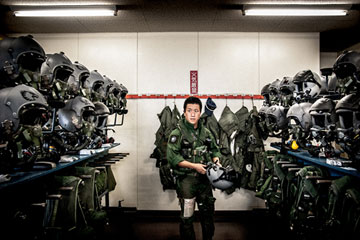
These days, Japanese pilot Kohta "Vader" Araki, who flies F-15s, is always on alert.
Riceman was on high alert. So was Vader (as in Darth), a Japanese fighter pilot whose sinister call sign belies his smiling countenance. At Naha Air Base, perched on the subtropical tail of the Japanese archipelago, F-15 pilots from the 204th tactical fighter squadron know what the sudden, hushed message broadcast over the loudspeakers one rainy afternoon in September means: another emergency fighter-jet mission for a nation that technically doesn't even possess a conventional military. Territorial tensions between Japan and China have intensified over a scattering of islands in the East China Sea, which Japan administers but to which China lays historic claim. As a result, the squall-prone skies over Naha have darkened with the shadow of scrambled jets overhead. "The stress level has increased," says Atsushi "Riceman" Takahashi, a veteran fighter pilot who now instructs younger charges. "The scramblings show our pride in securing our domain."
From April to June, 69 Japanese jets were deployed because of perceived threats from China, compared with just 15 during the same period last year. September was just as busy, with Japan's Self-Defense Force (SDF) responding to the first confirmed flight of a Chinese drone over Japan, the first reported flight of Chinese bombers on a course not far from Naha and a flotilla of Chinese coast-guard vessels sailing through waters near the disputed islands--called Senkaku by the Japanese and Diaoyu by the Chinese. "Going up [in an F-15] makes me feel like I'm really playing a part in national defense," says Kohta "Vader" Araki. "The responsibility is very heavy."
Naha Air Base borders Okinawa prefecture's main civilian airport, thronged with sunburned holiday seekers in flowered shirts. Commercial planes with colorful logos touch down just as gray camouflage F-15s roar into the sky. It is an incongruous scene in a nation that is divided over its martial past and future. After World War II, Japan's DNA was shaped into a pacifist helix, reinforced by a constitution that renounces war altogether. The charter was imposed by the victorious Americans, who wanted to ensure that Japan would not repeat its imperialist rampage across Asia. In exchange, the U.S. charged itself with maintaining Japan's national security. Japan was free to achieve its postwar economic miracle.
Now, under hawkish Prime Minister Shinzo Abe, Japan is expanding its military footprint and speaking out more forcefully against nations it sees as threatening its sovereignty, most notably China. For Abe and other conservatives in the ruling Liberal Democratic Party (LDP), Japan's samurai spirit is just as integral to the national makeup as any paeans to peace. A rewrite of the constitution, which has been interpreted as forbidding anything but defensive military maneuvers, is difficult--any change requires a two-thirds majority in both houses of the legislature, then a public referendum.
